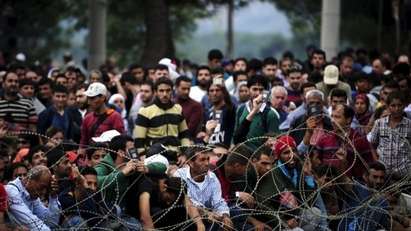Брутално: 16-годишен бежанец изнасили служителка в център на Червения кръст в Белгия
19 Февруари 2016, Събота, 01:12 ч.
Нападателят преминал през ограмотителен курс как да се отнасят с жените в Европа, но и това не охладило нагона му
Афганистански тийнейджър беше обвинен днес в Белгия за изнасилването на служителка в център за бежанци и кандидати за убежище, предаде Ройтерс. 16-годишният афганистанец, подал молба за убежище в Белгия, е насилил служителка на кетъринговата фирма, осигуряваща храната за центъра.Мигрантът проследил жената до мазето на бежанския център в град Менен, близо до границата на Белгия с Франция, и там я нападнал. Центърът е под опеката на Червения кръст. В изявление на организацията се посочва, че за първи път от 25 години насам се случва подобно нещо в неин бежански център в Белгия.
Говорителка на Червения кръст дори поясни, че преди две седмици организацията провела курс за мигранти как да се отнасят с жените и момчето, обвинено за изнасилването, е било на него.
До следващото съдебно заседание по случая афганистанският тийнейджър ще остане в арест за непълнолетни, допълва Ройтерс, цитирана от БТА.
Изнасилването наля още повече масло в огъня на дебата за мигрантите в Белгия и в Европа. Хората, които се нуждаят от курс, на който да ги учат как да се отнасят с жените, не трябва на първо място да са в нашата страна, заяви Том ван Грикен, лидер на антимигрантската белгийска партия Влаамс Беланг.
В категории:
Политика





 Дневен хороскоп за 1 март: Пазете се от измами и обърнете внимание на знаците на съдбата
Дневен хороскоп за 1 март: Пазете се от измами и обърнете внимание на знаците на съдбата


Иран удари и знаменития „Бурж ал Араб“ в Дубай
01/03/2026, Неделя 01:27
0
 Информация от Израел: Членове на семейството на Хаменей са убити при въздушни атаки
Информация от Израел: Членове на семейството на Хаменей са убити при въздушни атаки

 Козлодуй изпревари Челопеч и София по заплата
Козлодуй изпревари Челопеч и София по заплата

 Най-щастливите зодии през март - кого звездите ще изненадат приятно
Най-щастливите зодии през март - кого звездите ще изненадат приятно

 Тасним: Корпусът на гвардейците на Ислямската революция спря корабоплаването в Ормузкия проток
Тасним: Корпусът на гвардейците на Ислямската революция спря корабоплаването в Ормузкия проток

 Замесиха в измама звездата на НОВА Ники Дойнов
Замесиха в измама звездата на НОВА Ники Дойнов

 Най-добрите храни за силен имунитет през пролетта - естествена защита за организма
Най-добрите храни за силен имунитет през пролетта - естествена защита за организма

 Всяка неделя правя тази закуска - лесна рецепта за пухкави палачинки със сирене
Всяка неделя правя тази закуска - лесна рецепта за пухкави палачинки със сирене

 Убит ли е лидерът на Иран Али Хаменей?
Убит ли е лидерът на Иран Али Хаменей?

 Най-богатите зодии според астролози
Най-богатите зодии според астролози

 Как да свалим 5 килограма до лятото без глад - ефективен и здравословен план
Как да свалим 5 килограма до лятото без глад - ефективен и здравословен план







































The Case for Surge Funding
Project Syndicate, February 17, 2016
By George Soros
MUNICH – Important progress was made at the donors’ conference for Syrian refugees convened in London on February 4. But much more remains to be done. The international community is still vastly underestimating what is needed to support refugees, both inside and outside the borders of the European Union. To deal with the refugee crisis, while putting the EU’s largely unused AAA borrowing capacity to better use, requires a paradigm shift.
Rather than scraping together insufficient funds year after year, it is time to engage in “surge funding.” Spending a large amount of money up front would be far more effective than spending the same amount over several years. Frontloading the spending would allow us to address the most dangerous consequences of the crisis – including anti-immigrant sentiment in receiving countries and despondency and marginalization among refugees – more effectively. Making large initial investments would help tip the economic, political, and social dynamics away from xenophobia and disaffection, and toward constructive outcomes that benefit refugees and the recipient countries alike.
Surge funding has been used often to finance immunization campaigns. The International Finance Facility for Immunization (IFFIm), which borrows against future government contributions to immunization programs, has raised billions of dollars over the past several years to ensure that vaccination campaigns are successful as soon as possible. In the long run, this is more effective than spending the same amount of money in yearly installments. IFFIm provides a convincing precedent for the current crisis.
A sudden large influx of refugees can cause panic that affects the general population, the authorities, and, most destructively, the refugees themselves. The panic breeds a false sense that refugees are a burden and a danger, resulting in expensive and counter-productive measures, like erecting fences and walls and concentrating refugees into camps, which in turn breeds frustration and desperation among the refugees. If the global community could fund large-scale, concentrated programs to address the problem, the general public and the refugees would be reassured.
A surge in spending is needed both in Europe and in frontline states like Jordan, Lebanon and Turkey. The necessary investments include an overhaul of the EU’s asylum policy and improvement of its border controls. In frontline states, money is needed to provide refugees with formal employment opportunities, health care, and education. If life for refugees is made tolerable in frontline countries, and they believe that an orderly process is in place for gaining entry to Europe, they are more likely to wait their turn, rather than rushing to Europe and overwhelming the system. Similarly, if the refugee crisis can be brought under control, the panic will subside and the European public will be less prone to support anti-migrant policies.
Jordan could provide a test case. A country of 9.5 million people, it is providing refuge to 2.9 million non-citizens, including 1.265 million Syrians, and facing the influx of additional Syrians uprooted by Russian bombing. A combination of massive upfront direct financial assistance, enhanced trade preferences, and temporary debt relief is needed. A successful program for Jordan could demonstrate the international community’s ability to bring the refugee crisis under control, opening the way to similar programs for other frontline states, adjusted on a case-by-case basis, depending on local conditions.
The approach suggested here would cost more than EU member states can afford out of current budgets. A minimum of €40 billion ($45 billion) needs to be spent annually in the next 3-5 years; but even larger amounts would be justified to bring the migration crisis under control. In fact, so far, lack of adequate financing is the main obstacle to implementation of successful programs in any of the frontline countries, particularly in Turkey. While Germany has an unallocated budget surplus of €6 billion ($6.8 billion), other EU countries are running deficits. German Finance Minister Wolfgang Schäuble has proposed a pan-European fuel tax, but that would demand either unanimous agreement or a coalition of the willing.
This enhances the merits of having recourse to the EU’s largely unused AAA credit. The migration crisis poses an existential threat to the EU. Indeed, with the north pitted against the south, and the east confronting the west, the EU is coming apart at the seams. When should the EU’s AAA credit be mobilized if not at a moment when the EU is in mortal danger? It is not as if there is no precedent for this approach; throughout history, governments have issued bonds in response to national emergencies.
Tapping the AAA credit of the EU, rather than taxing consumption, has the additional advantage of providing much-needed economic stimulus for Europe. The amounts involved are large enough to be of macroeconomic significance, especially as they would be spent almost immediately and produce a multiplier effect. A growing economy would make it much easier to absorb immigrants, whether refugees or economic migrants. In short, surge funding is a win-win initiative, and it must be undertaken urgently.
ЩО НЕПРАВЯТ ТАКИВА НЕЩА В БЪЛГАРИЯ,СЪРБИЯ,УНГАРИЯ И Т.Н.ЗАЩОТО АЛАХ ИМ Е КАЗАЛ ЧЕ ШАМАРИТЕ ЩЕ СА МНОГО ЗДРАВИ И ЦЪРВУЛИТЕ СИ СТОЯТ МИРНО И ТИХО И ДАЖЕ НЕИСКАТ ДА СТОЯТ ТУК